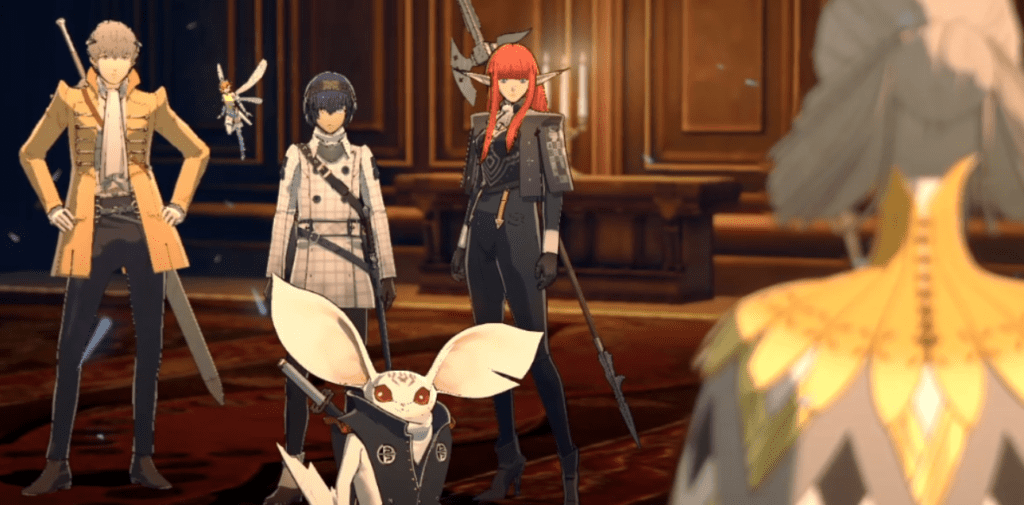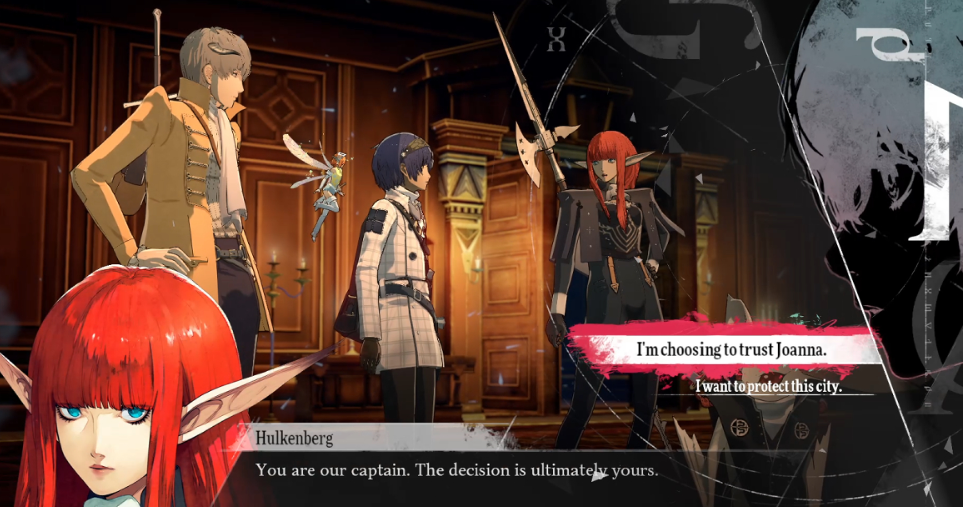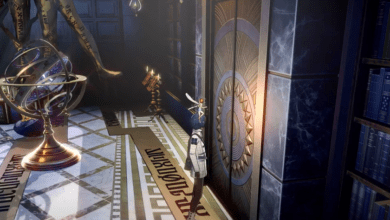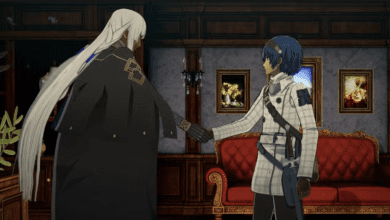Should You Trust Joanna in Metaphor ReFantazio? A Complete Guide to Making the Right Choice
Key Takeaways:
- Joanna’s trustworthiness in Metaphor ReFantazio is a pivotal decision, but it ultimately leads to a predetermined outcome, regardless of your choice.
- The illusion of choice presents a moral dilemma, encouraging players to weigh the consequences of trusting Joanna versus taking action to protect others.
- Joanna’s involvement in the story sparks dramatic confrontations, leaving a lasting impact on both the narrative and your character’s relationships.
Metaphor ReFantazio throws players into a world brimming with political intrigue, deep moral decisions, and complex characters. One of the most memorable moments is when you, as the protagonist, must decide whether or not to trust Joanna after defeating Homo Jaluzo. Joanna, a character tied to numerous wrongdoings, offers to help you, but the question remains should you trust her?

In this article, we’ll break down the implications of this decision, why it feels like an illusion of choice, and how this seemingly minor moment plays a significant role in shaping the story’s trajectory. We’ll also delve into the consequences of trusting Joanna or deciding to protect the city instead. If you’re wondering which path to take, read on to make an informed choice!
Joanna’s Proposal: Should You Trust Her?
After the battle with Homo Jaluzo, you’re faced with a new dilemma: what to do with Joanna, a character whose past actions have raised red flags throughout the story. It’s easy to see why players might hesitate. Joanna has committed serious crimes, and now she wants to offer help by appearing as the monster you need for the tournament. But the real question is, can she be trusted?
At this point, Metaphor ReFantazio provides players with a classic RPG scenario the illusion of choice. Regardless of your decision, the story will progress similarly, but it’s still an important moment in understanding the game’s narrative complexity.
The Illusion of Choice: Why Your Decision Matters
In many RPGs, the illusion of choice is used to give players a sense of agency, even if the outcomes are mostly predetermined. The situation with Joanna is no different. Whether you decide to trust her or not, the game subtly nudges you toward trusting her. It mirrors a previous decision you made when helping Glodell, reinforcing the idea that some outcomes are inevitable, no matter your intentions.
However, just because the outcome is set in stone doesn’t mean your decision lacks meaning. The moment you decide to trust Joanna (or not) reveals a lot about your character’s motivations and how you approach difficult moral situations.
Why Trusting Joanna Makes Sense
If you choose to trust Joanna, you’ll soon realize she is indeed truthful. She promises to confess her crimes publicly, and she keeps that promise in a dramatic moment that shifts the course of the game. Your character, alongside the party, will travel to Port Brilehaven while Joanna makes her preparations to address the people. This separation heightens the tension, as your party begins to question whether Joanna will show up as promised.

Doubts start to creep in, especially when Joanna is nowhere to be found for a while. You may even start to wonder if you made the wrong choice. But as the story unfolds, Joanna arrives at the Coliseum with Bardon, ready to confess her sins in front of everyone.
The Coliseum Showdown: A Test of Trust
The tension reaches its peak at the Coliseum. When Joanna walks into the arena, the crowd is stunned. After all, you’re the only competitor who didn’t bring a monster or other creature. Instead, you’ve brought a human Joanna, a member of the Sanctis Church, which is enough to provoke outrage from many onlookers.
As expected, Joanna steps up and confesses her crimes, turning the entire situation on its head. This bold move earns you the attention of key characters, including Louis, who later seeks a private conversation with you.
But was trusting Joanna the right choice? In this case, yes. Although it seemed risky, she follows through on her promise, and the story continues to evolve around the consequences of your actions.
What Happens if You Don’t Trust Joanna?
Now, what if you decide not to trust Joanna? This decision is where the illusion of choice comes into play more prominently. Choosing to distrust Joanna doesn’t drastically alter the storyline, but it does offer a different perspective on your character’s motivations.
By choosing not to trust her, you focus on protecting the city instead of relying on someone with a questionable past. This decision might feel more morally justified, especially if you believe Joanna’s crimes should not be overlooked. However, the game ultimately directs you back toward the same outcome, where Joanna still makes her appearance at the Coliseum and confesses her sins.
In essence, your decision doesn’t prevent Joanna from fulfilling her role in the story, but it does shape how you feel about your character’s approach to these dilemmas.
Trust vs. Protect: Which Path Should You Take?
While both choices lead to the same overarching conclusion, how you navigate this moral dilemma will define your experience. If you’re playing a character that believes in redemption and second chances, trusting Joanna is the natural choice. Her confession at the Coliseum will feel like a vindication of your decision to give her the benefit of the doubt.
On the other hand, if your character leans more towards justice and accountability, you might feel compelled to reject her help, focusing instead on protecting the city. Though the game nudges you towards trusting her, staying true to your character’s convictions can make this moment feel more personal.
Joanna’s Role in the Greater Story
Regardless of your decision, Joanna’s role in Metaphor ReFantazio is a turning point in the game’s narrative. She is not just a supporting character; she’s a symbol of how choices can feel weighty even when they don’t drastically alter the story. Her involvement stirs up dramatic confrontations, leading to deeper character development for you and your companions.
In the end, trusting Joanna or choosing to prioritize the city’s safety are decisions that shape the emotional and moral undertones of the game, even if the overarching plot remains unaffected.
FAQs
1. What happens if I choose not to trust Joanna?
Even if you decide not to trust Joanna, the story will still unfold in a similar way. She will appear at the Coliseum and confess her sins, but your character’s motivations and the emotional impact of the decision will feel different.
2. Is there any benefit to trusting Joanna in Metaphor ReFantazio?
Yes. Trusting Joanna leads to her eventual confession, which is a significant moment in the game’s story. While the outcome is predetermined, the decision to trust her reflects your character’s belief in redemption and second chances.
3. Can I protect the city instead of trusting Joanna?
Choosing to protect the city over trusting Joanna doesn’t drastically alter the storyline. The game subtly guides you toward the same conclusion, but your approach to the decision can define your character’s moral compass.
4. What makes Joanna’s confession so important?
Joanna’s confession is a pivotal moment in the game, as it draws attention from key characters and shifts the trajectory of the story. Her admission of guilt brings a dramatic turn to the unfolding narrative.
5. Does my choice really matter in Metaphor ReFantazio?
While the game may seem to offer an illusion of choice, your decisions still play a role in shaping how you perceive your character and the world around you. These moments reflect your character’s beliefs and values, even if the plot remains largely unchanged.





